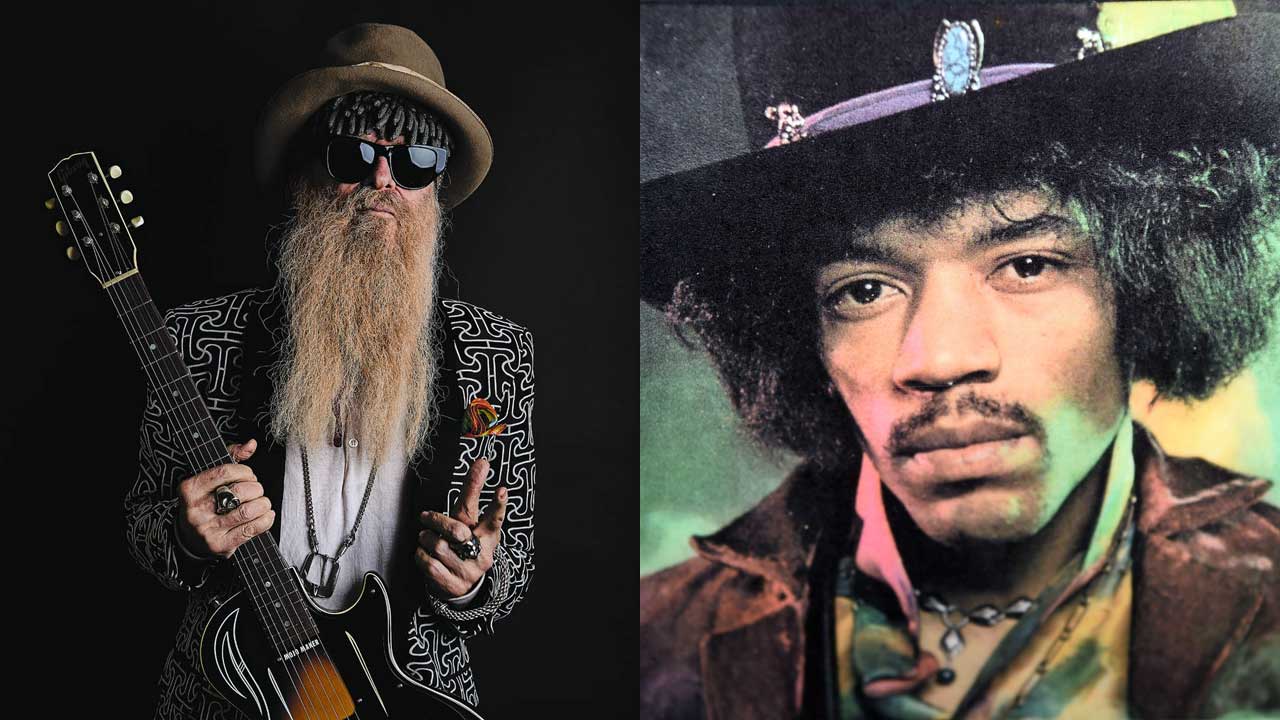Billy F Gibbons: What Jimi Hendrix means to me
ZZ Top's Billy Gibbons on touring with Jimi Hendrix, playing Hendrix covers, and his favourite Hendrix songs

Inspired initially by local peyote rockers 13th Floor Elevators, Billy Gibbons' pre-ZZ Top band The Moving Sidewalks’ spaced-out sound progressed fast after they opened a series of shows for Jimi Hendrix.
“He was the master of the Stratocaster,” says Gibbons. “He developed chord structures and new chord positionings for rock music, squeezing things out of a simple guitar-and-amplifier set-up that hadn’t been written about in any manual.”
Jimi gave Billy a pink, late-1950s Strat on the tour. “Hendrix said it was too pretty to burn,” Gibbons says. And below, he reveals exactly what Hendrix means to him.

First impressions
"I had a girlfriend from Texas who found herself on holiday in London, and she had the foresight to pick up a copy of the first Jimi Hendrix Experience record [Are You Experienced, ’67] and forward it to the States. I had my hands on it early on, certainly before its US release. And I remember standing at the turntable with eyes wide and jaw dropped. I was seventeen when that record landed in my lap and I was ready to just soak it up. There was hours spent just listening to the way he phrased his stuff.
"It was operating on a number of levels. The technique stood out immediately, and it was bolstered by some tone that had not become commonplace. I can almost bet that the engineers who designed the Fender Stratocaster never knew that these sounds would emanate from their handy invention. In the hands of Jimi Hendrix it was otherworldly.”
Meeting Hendrix
When the Jimi Hendrix Experience’s tour reached Texas in February 1968, Gibbons’s teenaged group the Moving Sidewalks opened the show. They didn’t have enough songs of their own to fill their 40-minute slot, and included covers of two Hendrix classics before he came on.
“To try and wrap your head around those compositions, it was something so new you didn’t quite know where to begin. We were fortunate to be able to interpret our versions of Foxy Lady and Purple Haze. They were Texas interpretations. On leaving the stage I was grabbed by the shoulders and there was Hendrix smiling. He said: ‘I got to meet you. You got a lot of nerve! I like it.’”
Sign up below to get the latest from Classic Rock, plus exclusive special offers, direct to your inbox!
Favourite Hendrix songs
"Foxy Lady and Purple Haze still reign supreme. The mind was twisted with the first album, then when he interpreted All Along The Watchtower it went from Dylan’s ownership to suddenly it became Hendrix’s song. Then there’s Red House. You can’t overlook Hendrix’s interpretation of the blues form. Quite recently they found a version of Hendrix playing an up-tempo version of Bobby Bland’s song Further On Up The Road. And it’s killer! Just wild.
"There’s all sorts of interesting revelations when you find versions of songs where you can just hear the vocal track as it’s being recorded. They must have gone back and found some of the original tapes with the vocal track. His singing style was so natural, very much off-the-cuff. He didn’t have to go back and re-sing much.”
Hendrix songs covered by ZZ Top
“Hendrix taught me how to do the string squiggle at the beginning of Foxy Lady. It’s a trick you have to practice, learning the use of, I should call it, controlled vibrato. Combine that with the power of a 100-watt Marshall amp and you can get some crazy tricks going off.
“The other song that really holds intrigue to this day: Little Miss Lover. It’s either a drummer’s delight or a drummer’s nightmare. Frank Beard said the challenge is in the right hand playing quarter notes, and between the snare and the kick playing not only eighth notes but sixteenth notes. And then there’s a push beat in the middle of all that. It’s really a workout. But if you can get through it, it’ll leave you smiling, that’s for sure. We played it early on. But we haven’t dusted that one off in quite some time.”
What made Hendrix so special
“Let’s use the word ‘willingness’. I was talking about this with Jeff Beck recently. The Stratocaster, the whammy bar, was capable of some pretty dramatic changes in pitch – the dive-bomb effect – and they had yet to perfect a way to keep it in tune. There are some recorded examples of Hendrix just going crazy with the whammy bar and it knocked the guitar pitifully out of tune. But his willingness… he just said ‘The hell with it. We’re gonna go on!’ And go on they did.
"The other word to use is ‘curiosity’. Part of that curiosity was fuelled by the sudden appearance of foot pedals to make all kinds of interesting ways to distress the guitar signal.
“He was always practising. Always curious about the next unusual twist. He was fascinated by Jeff Beck’s playing. I have vivid recollections of tip-toeing into Hendrix’s hotel room, and he always had a record player, a giant piece of furniture, in his room. He said: ‘Man, how do you think Jeff Beck is doing this?’ And I said: ‘Well, I can probably imagine Jeff Beck is scratching his head wondering the same about you.’”
The power of three
“The limitations of a trio are many. But along with the word ‘limitation’ goes the word ‘invitation’. It’s inviting to see how far you can push it under such austere conditions; Clapton, Jack Bruce and Ginger Baker didn’t do a bad job with Cream.
"When Hendrix came along his ensemble was just made to order. Their live recordings stand as testament to how groundbreaking they were as a unit. They were filling in the gaps in just the right places. ZZ Top took a cue from what I would call that spare but exquisite format."
Musician since the 1970s and music writer since the 1980s. Pop and rock correspondent of The Times of London (1985-2015) and columnist in Rolling Stone and Billboard magazines. Contributor to Q magazine, Kerrang!, Mojo, The Guardian, The Independent, The Telegraph, et al. Formerly drummer in TV Smith’s Explorers, London Zoo, Laughing Sam’s Dice and others. Currently singer, songwriter and guitarist with the David Sinclair Four (DS4). His sixth album as bandleader, Apropos Blues, is released 2 September 2022 on Critical Discs/Proper.

